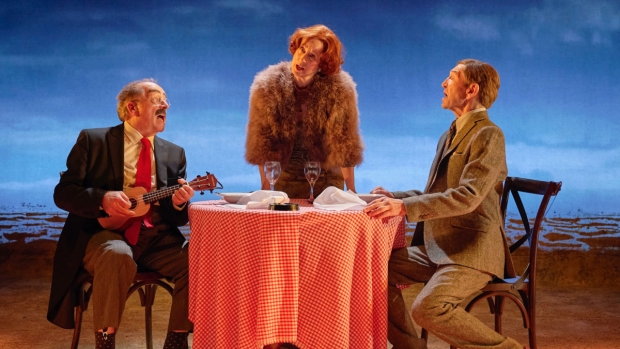”Dinner with Groucho” at the Arcola Theatre – review

© Ros Kavanagh
The idea that Groucho Marx and TS Eliot once met for dinner seems too good to be true. But it really did happen, in London in 1964 – just months before Eliot died. Even more curious is the fact that this followed a three-year exchange of letters that began with the poet sending fanmail to the film funnyman to request a photograph. What went down during their date is the stuff of myth.
It’s also the stuff of Frank McGuinness’s new play, his latest creative take on a remarkable moment in history. In Dinner with Groucho, Marx and Eliot (Ian Bartholomew and Greg Hicks, respectively) are imagined at a restaurant table, waiting endlessly for their food in a kind of absurdist setup. Meandering dialogue ensues. Bartholomew looks the part with thick eyebrows, moustache and cigar – rattling off Groucho-esque gags. “I will not recognise a court that has me as its judge,” goes one such quip.
Although the barmy repartee and 70-minute runtime belong to the Marx universe, the setting is a desolate landscape redolent of Eliot’s poem The Waste Land. The two men have been dreamt up – or perhaps summoned in a séance – by their host, a character known only as the Proprietor (Ingrid Craigie). Making things still more peculiar is the fact the starter is chicken soup (not duck soup as the iconic Marx Brothers film would have it), and that the plates and glasses remain empty throughout.
McGuinness depicts a meeting of minds which is vigorous but tense – not least when Marx, a Jewish comic, brings up Israel, as if to provoke Eliot, whose legacy is dogged by antisemitism accusations. Did they argue in real life? The play hedges its bets; avoiding direct confrontation in favour of ambiguities. In praise of the other man’s comedy, Eliot comes out with one of the most befuddling back-handed compliments of the whole play: “You struggle to say in so many words what you don’t mean.” Like other lines, this one is not left hanging for very long; the play’s tendency is to barrel on.
With many of us now happy to meet up with strangers we’ve only ever conversed with using online messaging tools, there’s something relatable about this enactment of awkward face-to-face chatter between two pen-pals. In real life, the pair seem to have had a friendship that was respectful but uneasy. (For his part, Marx gave a funeral tribute for Eliot in which he cracked a few one-liners, professed to know little about the other man’s work, and then read out a poem about a cat.)
But more interesting than the moments of conflict are the imagined similarities between the two men, in their insecurities and the way they think. They ruminate on topics as diverse as Shakespeare, death and endangered birds, as non-sequitur is piled upon non-sequitur.
Dinner with Groucho is a dish best enjoyed by fans of modernism and the Marx Brothers – two art forms which don’t seem to be so different after all. It’s a tantalising proposition, with the capacity to both baffle and amuse.












